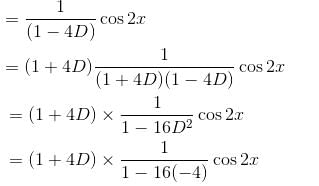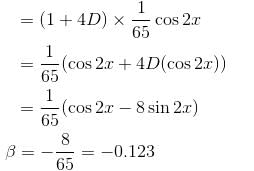Physics Exam > Physics Questions > If the Particular Integral (P.I.) of the diff...
Start Learning for Free
If the Particular Integral (P.I.) of the differential equation (D3 + 1)y = cos2x. is given by y = 1/65 (cos 2x - β sin 2x). Find the value of β
Correct answer is '-0.123'. Can you explain this answer?
Verified Answer
If the Particular Integral (P.I.) of the differential equation (D3 + 1...




The correct answer is: -0.123
Most Upvoted Answer
If the Particular Integral (P.I.) of the differential equation (D3 + 1...
Sin 2x), what is the general solution of the differential equation?
The general solution of a differential equation is the sum of the homogeneous solution and the particular integral.
The homogeneous solution of the differential equation (D^3 - 1)y = 0 can be found by assuming a solution of the form y = e^(mx), where m is a constant. Substituting this into the differential equation, we get (D^3 - 1)e^(mx) = 0. This simplifies to m^3e^(mx) - e^(mx) = 0. Factoring out e^(mx), we have e^(mx)(m^3 - 1) = 0. This equation holds if either e^(mx) = 0 (which is not possible) or m^3 - 1 = 0. Solving for m, we find m = 1, -1/2 + sqrt(3)/2, -1/2 - sqrt(3)/2.
Therefore, the homogeneous solution is y_h = C1e^x + C2e^((-1/2 + sqrt(3)/2)x) + C3e^((-1/2 - sqrt(3)/2)x), where C1, C2, and C3 are arbitrary constants.
The general solution of the differential equation is y = y_h + y_p. Substituting the given particular integral, we have y = C1e^x + C2e^((-1/2 + sqrt(3)/2)x) + C3e^((-1/2 - sqrt(3)/2)x) + 1/65 (cos 2x - sin 2x).
The general solution of a differential equation is the sum of the homogeneous solution and the particular integral.
The homogeneous solution of the differential equation (D^3 - 1)y = 0 can be found by assuming a solution of the form y = e^(mx), where m is a constant. Substituting this into the differential equation, we get (D^3 - 1)e^(mx) = 0. This simplifies to m^3e^(mx) - e^(mx) = 0. Factoring out e^(mx), we have e^(mx)(m^3 - 1) = 0. This equation holds if either e^(mx) = 0 (which is not possible) or m^3 - 1 = 0. Solving for m, we find m = 1, -1/2 + sqrt(3)/2, -1/2 - sqrt(3)/2.
Therefore, the homogeneous solution is y_h = C1e^x + C2e^((-1/2 + sqrt(3)/2)x) + C3e^((-1/2 - sqrt(3)/2)x), where C1, C2, and C3 are arbitrary constants.
The general solution of the differential equation is y = y_h + y_p. Substituting the given particular integral, we have y = C1e^x + C2e^((-1/2 + sqrt(3)/2)x) + C3e^((-1/2 - sqrt(3)/2)x) + 1/65 (cos 2x - sin 2x).

|
Explore Courses for Physics exam
|

|
Question Description
If the Particular Integral (P.I.) of the differential equation (D3 + 1)y = cos2x.is given by y = 1/65 (cos 2x -β sin 2x).Find the value ofβCorrect answer is '-0.123'. Can you explain this answer? for Physics 2025 is part of Physics preparation. The Question and answers have been prepared according to the Physics exam syllabus. Information about If the Particular Integral (P.I.) of the differential equation (D3 + 1)y = cos2x.is given by y = 1/65 (cos 2x -β sin 2x).Find the value ofβCorrect answer is '-0.123'. Can you explain this answer? covers all topics & solutions for Physics 2025 Exam. Find important definitions, questions, meanings, examples, exercises and tests below for If the Particular Integral (P.I.) of the differential equation (D3 + 1)y = cos2x.is given by y = 1/65 (cos 2x -β sin 2x).Find the value ofβCorrect answer is '-0.123'. Can you explain this answer?.
If the Particular Integral (P.I.) of the differential equation (D3 + 1)y = cos2x.is given by y = 1/65 (cos 2x -β sin 2x).Find the value ofβCorrect answer is '-0.123'. Can you explain this answer? for Physics 2025 is part of Physics preparation. The Question and answers have been prepared according to the Physics exam syllabus. Information about If the Particular Integral (P.I.) of the differential equation (D3 + 1)y = cos2x.is given by y = 1/65 (cos 2x -β sin 2x).Find the value ofβCorrect answer is '-0.123'. Can you explain this answer? covers all topics & solutions for Physics 2025 Exam. Find important definitions, questions, meanings, examples, exercises and tests below for If the Particular Integral (P.I.) of the differential equation (D3 + 1)y = cos2x.is given by y = 1/65 (cos 2x -β sin 2x).Find the value ofβCorrect answer is '-0.123'. Can you explain this answer?.
Solutions for If the Particular Integral (P.I.) of the differential equation (D3 + 1)y = cos2x.is given by y = 1/65 (cos 2x -β sin 2x).Find the value ofβCorrect answer is '-0.123'. Can you explain this answer? in English & in Hindi are available as part of our courses for Physics.
Download more important topics, notes, lectures and mock test series for Physics Exam by signing up for free.
Here you can find the meaning of If the Particular Integral (P.I.) of the differential equation (D3 + 1)y = cos2x.is given by y = 1/65 (cos 2x -β sin 2x).Find the value ofβCorrect answer is '-0.123'. Can you explain this answer? defined & explained in the simplest way possible. Besides giving the explanation of
If the Particular Integral (P.I.) of the differential equation (D3 + 1)y = cos2x.is given by y = 1/65 (cos 2x -β sin 2x).Find the value ofβCorrect answer is '-0.123'. Can you explain this answer?, a detailed solution for If the Particular Integral (P.I.) of the differential equation (D3 + 1)y = cos2x.is given by y = 1/65 (cos 2x -β sin 2x).Find the value ofβCorrect answer is '-0.123'. Can you explain this answer? has been provided alongside types of If the Particular Integral (P.I.) of the differential equation (D3 + 1)y = cos2x.is given by y = 1/65 (cos 2x -β sin 2x).Find the value ofβCorrect answer is '-0.123'. Can you explain this answer? theory, EduRev gives you an
ample number of questions to practice If the Particular Integral (P.I.) of the differential equation (D3 + 1)y = cos2x.is given by y = 1/65 (cos 2x -β sin 2x).Find the value ofβCorrect answer is '-0.123'. Can you explain this answer? tests, examples and also practice Physics tests.

|
Explore Courses for Physics exam
|

|
Signup for Free!
Signup to see your scores go up within 7 days! Learn & Practice with 1000+ FREE Notes, Videos & Tests.


















